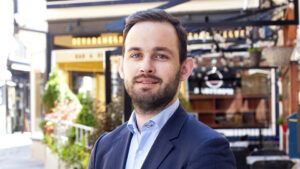
Green Dream with Skagen’s Myge: Expect ESG backlash to continue
In this Green Dream interview, Sondre Myge, head of ESG at Skagen Funds, answers questions on how Skagen engages with companies, trends in the ESG space and how the industry is moving from the first iteration of ESG to “evolved version”.
Watch the full video interview above and read the transcript below.
HD: Hello, I’m Holly Downes and welcome back to the Green Dream. Today, I’m joined by Sondre Myge, head of ESG at Skagen funds. Thank you for being here. Can you tell me about Skagen funds and how it is unique to what else is offered on the ESG market?
SM: Skagen is a long only active value manager across five different equities strategies. One of our more unique selling points when it comes to ESG is the virtue of being active, global and unconstrained. We are bottom-up investors and we have a comprehensive ESG process in our investment framework that allows us to look at the specific drivers at a company level rather than sort of a portfolio level or thematic level. This gives us deeper insights into the drivers of ESG risks and opportunities at a much more specific area of focus.
HD: What are the key themes or investment areas that are on the fund currently?
SM: The green transition as a whole is a huge secular trend that for any investor will generate a lot of investment opportunities, especially for active stock pickers.
Key areas of focus for us last year was on environmental topics, engaging with our emerging market equities and how they’re positioned in different market conditions to take on transition requirements in the geographies they operate in and understand how they should position. Human rights is always a recurring topic, both in terms of direct operations, but also in terms of supply chains and making sure that companies are on the forefront of managing what is a very dynamic field.
HD: Amazing. Can you tell me how Skagen funds engage with companies and what kind of approaches you take when it comes to engagement?
SM: One area that I think Skagen has been quite unique on since we were founded in 1993 is site visits. We cherish the long term shareholder relationship we have with many of our companies and some of which we’ve been invested in for decades.
Meeting companies is something that separates us from many others. But of course, on top of that, we have our own engagement framework which builds on the comprehensive ESG framework already in place. We have done our own in-house ESG analysis, coupled with with a traffic light system which provides plenty of input to portfolio managers and topics to potentially address in conversation with with companies. This enables us to monitor from an early start from screening in a new idea to executing that investment case and monitor the areas of ESG that we think is most important to the investment case.
HD: And could you give me an example of Skagen fund’s most successful engagement project?
SM: One interesting example would be Samsung Electronics, in part because it’s an investment we’ve had since 1997. This brings back the value of being a long term shareholder and building that relationship with a company. We engage with many others on sort of the issues around troubles in South Korea. Over the course of our engagement period, Samsung recognised the value of ESG when it comes to reputation, longer term share price performance and noise around the stock. During that dialog, which lasted one and a half years after I joined, we saw very tangible improvements in how they were thinking about it.
We saw similar examples with with other South Korean companies that we were engaging with at the time, such as Andiamo, and how they were addressing labour relations. Since then, they have really good labour relations between the executives and the shop.
HD: And what are your views on new and ongoing trends in the ESG space?
SM: It is a fast evolving landscape. I think many in the industry are looking out for regulations. We’ve got the SDR coming in the UK now and we’ve had a year and a half to two years of trying to comply with these regulations because there is always noise coming out from the EU in terms of trying to revise that framework. So, many will be conscious of regulatory requirements.
From a market perspective, it is a big year for elections, in particular the US election where I think many would expect or at least fear that Trump victory will be challenging for the IRA outlook. In emerging markets, you have India where hopefully Modi will secure a re-election. I say hopefully because I think the markets responded very positively to many of the infrastructure programs that they’ve put forward and that can help bring out many of the easy credentials and opportunities that are in that country.
And lastly, and I think everyone should be prepared for the ESG backlash to continue to some extent. It is one that is rhetorical at this stage. You still see strong flows into new products, but I think we’re in this transitional phase where we’re moving from the first iteration of ESG to call it evolved version, which will look a bit different.
HD: Well, thank you for being here today, Sondre.
SM: Thank you for having me.